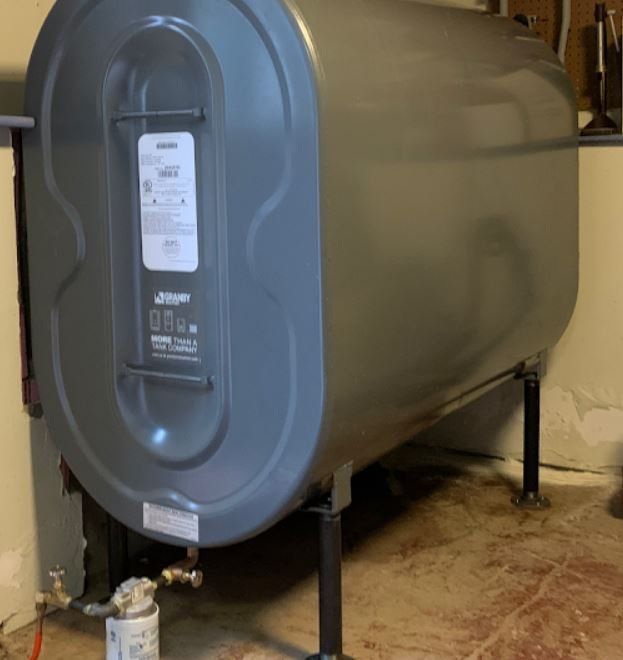Basement Oil Tank Replacement Cost: What's the Average?
Concerned about the basement oil tank replacement cost? Expect to spend between $1,500 and $4,000, depending on factors like tank size and installation complexity.
Wondering about the basement oil tank replacement cost? Getting quotes from local contractors can help you find the best price for your specific situation and needs.
If you're a homeowner with an aging basement oil tank, you're likely facing the need for a replacement. The average cost of basement oil tank replacement can vary significantly, depending on several factors. This guide will explore the typical costs associated with this project, helping you plan your budget and understand the factors that influence pricing.
Key Takeaways
- The cost of basement oil tank replacement can range from $2,000 to $8,000 or more, depending on the tank size, material, accessibility, and disposal requirements.
- Older underground heating oil tanks pose a risk of leaks and environmental contamination, making underground storage tank removal a necessary consideration.
- Factors like residential oil tank replacement and home heating oil tank replacement price can significantly impact the overall project cost.
- Properly disposing of an old oil tank and ensuring compliance with local regulations are crucial to avoid oil tank abandonment cost.
- Exploring alternative heating solutions, such as aboveground oil tank installation, may provide cost-saving opportunities.
Understanding the Need for Oil Tank Replacement
Many homeowners with basement oil tanks are faced with the need to replace them due to the tanks' age and potential for leaks or failure. Older oil tanks, particularly those made of steel, can become corroded and weakened over time, posing a significant risk of spills and environmental contamination.
Aging Oil Tanks: A Ticking Time Bomb
As underground heating oil tanks age, the risk of leaks and system failures increases dramatically. These aging tanks can develop cracks, holes, and other structural issues that allow the oil tank contents to seep into the surrounding soil and groundwater. This not only poses a serious environmental hazard but can also lead to costly oil tank abandonment cost and underground oil tank removal processes.
Environmental Concerns and Regulatory Compliance
The presence of a leaking or failing basement oil tank can also trigger strict environmental regulations and compliance requirements. Homeowners may be obligated to remove underground oil tank and address any resulting soil or groundwater contamination, often at significant expense. Proactively replacing aging oil tanks can help homeowners avoid these environmental and regulatory pitfalls.
Factors Influencing Basement Oil Tank Replacement Cost
The cost of replacing a basement oil tank can vary significantly based on several key factors. Understanding these factors is crucial in accurately estimating the expenses associated with this project.
Tank Size and Material
The size and material of the oil tank itself play a significant role in determining the replacement cost. Larger tanks, typically ranging from 275 to 550 gallons, will generally cost more to replace than smaller, 100-200 gallon tanks. Additionally, the material of the tank, such as steel or fiberglass, can impact the pricing, with fiberglass tanks often being more expensive than their steel counterparts.
Accessibility and Location
The accessibility and location of the oil tank can also influence the replacement cost. Tanks that are easily accessible and located in an open, unobstructed area may cost less to replace compared to tanks that are tucked away in tight spaces or require complex excavation work. The complexity of the installation and any necessary site restoration efforts can drive up the overall project expenses.
Removal and Disposal Fees
The cost of removing and properly disposing of the old oil tank is an essential factor to consider. This process often involves specialized equipment, permits, and the safe handling of any remaining fuel or contaminants. Additionally, the disposal fees charged by local authorities or environmental agencies can add to the overall cost of the basement oil tank replacement project.
Basement Oil Tank Replacement Cost: Exploring the Average Expenditure
When it comes to the cost of replacing a basement oil tank, the average expenditure can vary significantly. According to industry data, the basement oil tank replacement cost typically ranges from $3,000 to $6,000, with the home heating oil tank replacement price falling within this range. However, the actual cost can be influenced by several factors, including the size and material of the tank, the accessibility and location, and the fees associated with the removal and disposal of the old tank.
To provide a more detailed breakdown, the underground storage tank removal prices can range from $1,000 to $4,000, depending on the complexity of the project. This includes the cost of excavation, tank removal, soil remediation, and proper disposal of the old tank. The remaining portion of the total cost is usually allocated to the installation of the new tank, which can vary from $2,000 to $3,000 depending on the type of tank and the complexity of the installation process.
It's important to note that these are general estimates, and the actual basement oil tank replacement cost you may encounter can be influenced by your specific location, regional pricing, and the unique characteristics of your home. Consulting with local contractors and obtaining multiple quotes can help you better understand the range of costs in your area and make an informed decision about your oil tank replacement project.
Hiring Professional Oil Tank Removal Services
When it comes to replacing your basement oil tank, it's crucial to work with licensed and insured professional contractors. These experts have the necessary training, equipment, and expertise to ensure the safe and compliant removal and replacement of your oil tank. By hiring a reputable residential oil tank replacement service, you can avoid the potential risks and liabilities associated with heating oil tank decommissioning or underground oil tank decommissioning tasks.
Importance of Licensed and Insured Contractors
Proper basement oil tank replacement cost removal and disposal require specialized knowledge and adherence to strict environmental regulations. Licensed and insured contractors have the necessary certifications, permits, and insurance coverage to handle these tasks safely and legally. Attempting to tackle the oil tank abandonment cost or removal process on your own can lead to costly fines, environmental damage, and personal liability.
Evaluating Quotes and Comparing Prices
When researching basement oil tank replacement cost service providers, be sure to obtain multiple quotes and compare the pricing. Prices can vary significantly based on factors such as the tank size, accessibility, disposal fees, and the contractor's experience. Thoroughly evaluate the quotes, taking into consideration the services included, the contractor's credentials, and any warranties or guarantees they offer. This thorough evaluation will help you make an informed decision and ensure you receive the best value for your investment.
Cost-Saving Strategies for Oil Tank Replacement
While the basement oil tank replacement cost can be significant, there are several strategies you can employ to potentially save money on this project. By carefully timing your replacement project and exploring alternative heating solutions, you can maximize your savings and minimize the financial impact of this necessary home improvement.
Timing Your Replacement Project
The residential oil tank replacement cost can often be influenced by the time of year you choose to replace your oil tank. Typically, demand for these services is higher during the fall and winter months, as homeowners prepare for the heating season. By scheduling your replacement project during the off-season, typically in the spring or summer, you may be able to take advantage of lower labor costs and more availability from contractors, potentially leading to a lower home heating oil tank replacement price.
Exploring Alternative Heating Solutions
Another way to potentially save on the oil tank abandonment cost is to consider transitioning to an alternative heating source, such as a heat pump or a natural gas system. While the initial aboveground oil tank installation cost or underground storage tank removal prices may be higher, the long-term savings on heating fuel and maintenance could offset the upfront investment. It's important to carefully weigh the pros and cons of different heating options to determine the best solution for your home and budget.
Conclusion
Replacing a basement oil tank is a significant investment, but it's a necessary step to ensure the safety and compliance of your home's heating system. By understanding the average costs associated with this project and the factors that influence pricing, you can better plan your budget and make informed decisions.
Whether you're facing the need to remove an underground oil tank, decommission a heating oil tank, or install a new aboveground oil tank, it's crucial to work with licensed and insured professionals who can guide you through the process. By exploring cost-saving strategies, such as timing your replacement project or considering alternative heating solutions, you can potentially mitigate the financial impact of this important home improvement project.
Ultimately, replacing your basement oil tank is an investment in the safety and efficiency of your home. By staying informed about the average replacement costs and the factors that influence them, you can make a well-informed decision and ensure your home's heating system remains in compliance with local regulations and environmental standards.
FAQ
What is the average cost of basement oil tank replacement?
The average cost of basement oil tank replacement can range from $3,000 to $7,000, depending on several factors such as the tank size, material, accessibility, and the scope of the project.
What are the key factors that influence the cost of basement oil tank replacement?
The main factors that can impact the cost of basement oil tank replacement include the tank size and material, the accessibility and location of the tank, and the fees for removal and disposal of the old tank.
Do I need to hire a professional for oil tank removal and replacement?
Yes, it's highly recommended to hire licensed and insured professional contractors for the safe and compliant removal and replacement of your basement oil tank. These experts have the necessary training, equipment, and expertise to handle this project properly.
Are there any cost-saving strategies for basement oil tank replacement?
Yes, there are a few strategies you can consider to potentially save money on your basement oil tank replacement project, such as timing the replacement to take advantage of seasonal pricing and exploring alternative heating solutions.
What are the environmental concerns and regulatory compliance issues related to underground oil tanks?
Older underground oil tanks can pose a significant risk of leaks and environmental contamination, which is why most local and state regulations require the proper removal or abandonment of these tanks. Failure to comply with these regulations can result in costly fines and remediation efforts.


